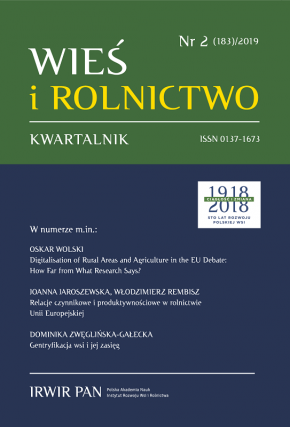The Activity of the Polish Popular Press for Rural Areas During the Prussian Partition
DOI:
https://doi.org/10.53098/wir022019/06Keywords:
farming, popular press, journals, rural areas, Prussian partitionAbstract
Studies of the press for the rural populations in the 19th and early 20th centuries form the basis for an analysis of changes in the publishing market and readers since the beginning of the print media up to political and economic transformation. This paper explores origins of publishing services for the rural population in the territories under Prussian occupation. Comparison of the titles with regard to the content, audiences and editorial teams in the first periodicals and popular press facilitated the determination of the functions of the farming press in the above period and region. An important factor to be recognised is the organisation of publishing companies and their influence on the audiences, despite press censorship. In the part of Poland under Prussian occupation the first large publishers had been established, publishing both newspapers and books. The activity of the press for rural audiences from the 19th century up to World War I varied. Educational, social, and religious content dominated in these editions. The fight to preserve Polishness in all three annexations, even though it varied depending on the government administration, focused on the dissemination of knowledge of Polish history and learning the native language.
References
Bieńkowska B. (2005). Książka na przestrzeni dziejów. Warszawa: Centrum Edukacji Bibliotekarskiej, Informacyjnej i Dokumentacji.
Cieślak T. (1976). Prasa w zaborze pruskim (Śląsk, Pomorze, Warmia, Mazury) w latach 1871–1918. W: J. Łojek (red.). Prasa polska w latach 1864–1918 (s. 202–214). Warszawa: Pracownia Historii Czasopiśmiennictwa Polskiego, Instytut Badań Literackich PAN.
Danielewski I., Chociszewski J. (red.) (1873). Kalendarz Majstra od Przyjaciela Ludu. Chełmno: Nakładem Ignacego Danielewskiego.
Fedorowicz M. (1996). Dorobek wydawniczy Ignacego Danielewskiego – drukarza chełmińskiego (1829–1907). Acta Universitatis Nicolai Copernici,Bibliologia I – Nauki Humanistyczno-Społeczne, 306, 139–150.
Gzella G. (1994). „Pisma dla ludu”: pod zaborami w pierwszej połowie XIX wieku. Toruń: Uniwersytet Mikołaja Kopernika.
Gzella G. (2004). „Przed wysokim sądem”: procesy prasowe polskich redaktorów czasopism dla chłopów w zaborze pruskim. Toruń: Uniwersytet Mikołaja Kopernika.
Jakóbczyk W. (1976). Prasa w Wielkopolsce (1859–1918). W: J. Łojek (red.). Prasa polska w latach 1864–1918 (s. 177–201). Warszawa: Pracownia Historii Czasopiśmiennictwa Polskiego, Instytut Badań Literackich PAN.
Lato S. (1963). U źródeł prasy „dla ludu”. W: I. Turowska-Bar (red.). Polskie czasopisma o wsi i dla wsi od XVIII w. do roku 1960: materiały bibliograficzno-katalogowe (s. 4–22). Warszawa: Ludowa Spółdzielnia Wydawnicza.
Łepkowski T. (1973). Słownik historii Polski (wyd. 6). Warszawa: Wiedza Powszechna.Owsińska A. (1955). Sprawa chłopska w świetle publicystyki poznańskiej z lat 1823–1848. Warszawa: Państwowe Wydawnictwo Naukowe.
Stępień S. (1984). Prasa ludowa w Polsce: zarys historyczny. Warszawa: Prasa ZSL.
Syska H. (1949). Od „Kmiotka” do „Zarania”: z historii prasy ludowej. Warszawa: Wydawnictwo Ludowe.
Wójcik A. (2002). Praca organiczna w myśli ludowej na przełomie XIX i XX wieku. Rocznik Dziejów Ruchu Ludowego, 22, 77–88.
Czasopisma:
„Biedaczek, czyli mały i tani tygodnik dla biednego ludu” 1849, nr 10, s. 1; 1850, nr 7, s. 2–4.
„Nadwiślanin” 1850, nr 2, s. 1.
„Pismo dla Ludu Polskiego” 1845, nr 9/10, s. 2.
„Praca: Tygodnik dla wszystkich stanów, poświęcony sprawom rolnictwa, handlu i przemysłu” 1896, nr 7, s. 4; 1908, nr 1, s. 1.
„Przyjaciel Ludu” 1834, nr 1, s. 12; 1842, nr 32, s. 256; 1846, nr 8, s. 62.
„Szkółka niedzielna” 1839, nr 3, s. 1; 1848, nr 4, s. 4; 1851, nr 8, s. 2.
„Wielkopolanin” 1848, nr 3, s. 4; 1849, nr 5, s. 4; 1883, nr 19, s. 1–2; 1912, nr 7, s. 3.











